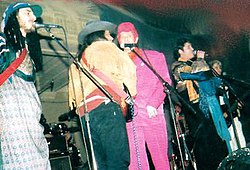
Bajaga i Instruktori are a Serbian and former Yugoslav rock band. Founded in Belgrade in 1984 by composer, lyricist and guitarist Momčilo Bajagić "Bajaga", the group possesses a rich discography and a plethora of hit songs that placed them at the top of the former Yugoslav rock scene, alongside other mega-selling bands such as Bijelo Dugme and Riblja Čorba.

Idoli were a Serbian new wave band from Belgrade. They are considered to be one of the most notable acts of the Yugoslav rock scene, and their 1982 album Odbrana i poslednji dani was on several occasions voted by the music critics as the greatest Yugoslav rock album.

Galija is a Serbian and former Yugoslav rock band formed in Niš in 1976.

Smak was a Serbian and Yugoslav band from Kragujevac. The group reached the peak of popularity in the 1970s when it was one of the most notable acts of the former Yugoslav rock scene. The band's leader, guitarist Radomir Mihailović, nicknamed Točak, is considered one of the most influential guitarists on the former Yugoslav rock scene.

Električni Orgazam is a Serbian rock band from Belgrade. Originally starting as a combination of new wave, punk rock and post-punk, the band later slowly changed their style, becoming a mainstream rock act. They were one of the most notable acts of the former Yugoslav rock scene.
Generacija 5 is a Serbian and former Yugoslav band from Belgrade. The band was formed in 1977 and initially performed jazz rock, later moving to harder rock sound, achieving nationwide popularity and releasing a number of hits during the late 1970s and early 1980s.

Vampiri are a Serbian and Yugoslav rock band from Belgrade. The band was formed in 1990, and performed music influenced by the 1950s doo-wop and rockabilly. After releasing two studio albums, they disbanded in 1993. The band reunited in 1995, releasing two more albums, second of which featured harder rock sound, only to disband again in 1998. In 2012, the band reunited once again.
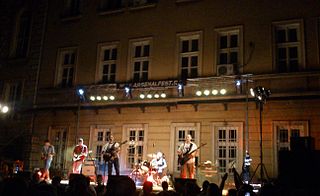
Babe is a Serbian rock supergroup from Belgrade.

Pišanje uz vetar is the fifteenth studio album from Serbian and former Yugoslav rock band Riblja Čorba, released in 2001.
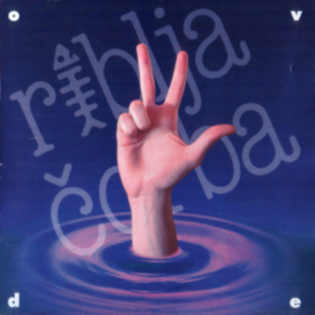
Ovde is the sixteenth studio album from Serbian and former Yugoslav rock band Riblja Čorba, released in 2003.

Crni Biseri was a Serbian and former Yugoslav rock band, notable as one of the pioneers of the former Yugoslav rock scene.
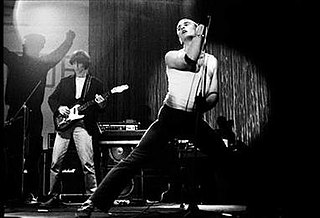
Petar i Zli Vuci were a former Yugoslav new wave/ska band from Belgrade, notable as the participant of the Artistička radna akcija project.

Nikola Čuturilo, also known as Čutura is a Serbian rock musician. He is known as a guitarist for the band Riblja Čorba, as well as for his solo work.

S Vremena Na Vreme is a Serbian and Yugoslav rock band formed in Belgrade in 1972. S Vremena Na Vreme were one of the pioneers of the Yugoslav 1970s acoustic rock scene, and one of the pioneers in incorporating Balkan folk music elements into rock music on the Yugoslav rock scene.
Lutke is a Serbian power pop band from Belgrade.

Dragoljub Đuričić was a Serbia-based Montenegrin drummer.
Du Du A was a Serbian alternative rock band from Belgrade.
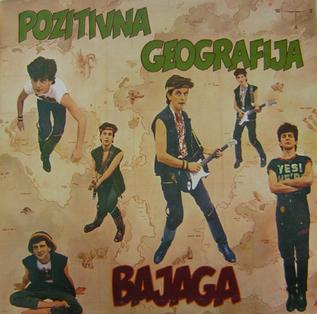
Pozitivna geografija is the 1984 debut album from Serbian and former Yugoslav rock band Bajaga i Instruktori, released in 1984. Originally released as Momčilo Bajagić "Bajaga"'s solo album, the album was later included in Bajaga i Instruktori's official discography, as Bajagić recorded it with musicians with which he would later form Bajaga i Instruktori.

Sa druge strane jastuka is the second studio album from Serbian and former Yugoslav rock band Bajaga i Instruktori, released in 1985. Although it is the first album released under the name Bajaga i Instruktori, Sa druge strane jastuka is considered Bajaga i Instruktori second studio album by the band themselves.

Ruž was a Serbian and Yugoslav pop rock band from Belgrade.
